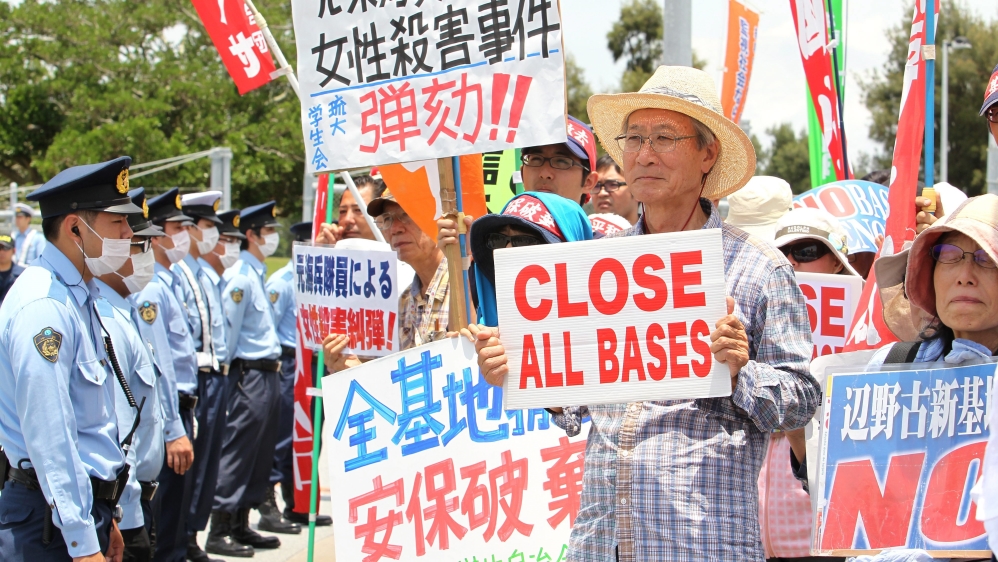By Valerie Cha

A 50-year old grandmother, native to the islands of Okinawa, wakes up at the peak of dawn and rushes down to the housing base where an empty coffee pot is waiting to be filled. She spends her morning cleaning common areas and preparing new linens for 60 rooms that require service every day. Meanwhile, her brother is driving a bus filled with young marines across the island to another base for training and her daughter is bagging groceries at the Commissary (base grocery store) on the other side. Let’s not forget her grandson, who is still recovering in the hospital after turning a wrong corner and encountering a drunk marine behind the wheel. Some say it’s work and some say it’s life, but is it necessary? The war ended in 1945, yet, Okinawans are still suffering from the presence of Americans. As I mentioned in my first blog, this ongoing battle continues to exist while the grandmother and her family silently live through the decisions of politicians who sip Da-Hong Pao Tea from their suite balconies beyond the island.
This is how I, and a few Americans as described in my previous blog, saw it to be. The relationship between each Okinawan in the story above may not be true, but the idea that the Okinawans are still working their way through the aftermath of war, is true. Although American military bases remain on the island to defend Japan and the region, many islanders wish “the bases would close and their 50,000 soldiers and families would go home” (American Experience).
/arc-anglerfish-arc2-prod-mco.s3.amazonaws.com/public/RNKEWY2MANAQLPLLVLRQU2LTKE.jpg)
Considering that the opinions of Americans on the issue have already been discussed, I wanted to explore the voices of islanders and locals on Okinawa. From my own experiences on the island and bases, I did not encounter any negative behaviors or comments towards me as an American. Honestly, I did not think much of how I was contributing to the issue of being an American in Okinawa. It was not until I witnessed protesting against the relocation of bases and dove deep into research about the issue, that I came to realize how badly Okinawans wanted us out.
“Opposition to the overpowering American presence crystallized nearly two decades ago after the rape of a teenage girl by U.S. military personnel. The bases remain because no one else in Japan wants to host American military forces.” – Doug B., Senior at Cato Institute, Specialist in foreign policy and civil liberties.
The incident, in particular, may have occurred two decades ago, but there have been a growth in conflicts ever since. NPR’s Elise Hu talks with Anna Fifield, Tokyo Bureau Chief for The Washington Post about the locals’ opposition to the growth in American presence. Three days prior to their conversation, a U.S. Marine stationed in Okinawa drunkenly crashed his truck into another vehicle, killing the 61-year-old Japanese driver. This type of collision involving U.S. personnel on the island, along with helicopter crashes, rape, and murder, has been occurring over the years (NPR, 2017). The U.S. Military tries to prevent these incidents by banning consumption of alcohol, setting stricter curfews, and restricting military personnel from leaving their housing for a period of time. Once the period is over, military personnel engage in the same activities as if their impulsive decisions did not cause harm. As described by Fifield, short term solution plans are executed and an apology from the head of U.S. forces is given to the governor of Okinawa. However, the governor speaks for his people when he says, “we’re sick of hearing these excuses time and time again… we feel like you are not good neighbors anymore” (NPR, 2017).
Fifield states that many Okinawans believe they unfairly shoulder the burden of the U.S. alliance with Japan. Although Okinawa makes up only one percent of Japanese land, it houses 64 percent of the American bases in Japan (NPR, 2017). The saying, “enough is enough,” is one that has been continuously repeated by Okinawans for the past few decades. The remaining question is: when will the U.S. and Japanese government hear them out and see that their decisions have done enough?
Hopefully with the current fight against the relocation of Futenma Air Base, both governments will finally make a decision that benefits the locals and the island.